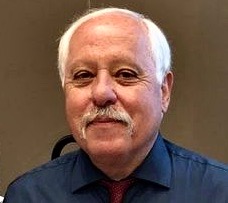Assembly delegates also amend bylaws, approve the organization's dues structure and address other governance issues. Chapters, districts and sections all send representatives to the annual meeting. Having served as an assembly delegate about a dozen times over the years, I was surprised to learn that much had changed as the wheels of governance ground on in my absence since the "Boston Tea Party" in 2017.
Departing Eugene on Saturday, October 12, my first order of business was to figure out how I could track the Duck football team play the Ohio State Buckeyes in what had been billed as the college football game of the week. After cooling my heels at the terminal during my layover in Seattle, I boarding my flight to Anaheim. Kickoff was nigh, and much to my delight, the game was on television my flight What a break!
The first half was a competitive slugfest with numerous lead changes, and the Ducks would lead at halftime, 22-21. Unfortunately, my plane had landed at John Wayne Airport in Santa Ana, and I would need to deplane, find my way to the baggage claim and hail a cab for a ride to the Anaheim Marriott. Missing most of the third quarter, I opted to head to the hotel bar before checking in to the Anaheim Marriott.
Ordering a stiff drink, I utilized the game tracker application, an adequate, but exasperating, way to keep up on a game.
With the clock stopping on every single called time out, play review and injury time out, the game continued to see-saw down to the wire until the Ducks would ultimately prevail, 32-31, when the clock read 0:00.
On Sunday, October 13, it was time for me to continue my review of the issues that would be addressed at the 2024 PRSA Leadership Assembly, As is the case with many organizations and trade associations, trends in governance tend to ebb and flow over time. Since my last stint as an assembly delegate for either my chapter or district, PRSA has been tilting toward a more top-down, rather than egalitarian, leadership model.
After conducting a review of the nominating process in 2016, PRSA initiated a more hierarchical approach to the selection of officers and directors. The organization also planned to review of the process after five years. Historically, PRSA Oregon and its colleagues from chapters throughout North Pacific District had resisted attempts to limit broad participation by the electorate in the selection of PRSA officers.
So I was pleasantly surprised to learn that this year, two amendments returning to a more representative approach to the selection of PRSA officers and directors.
PRSA Oregon universally concurred that support of the two bylaw amendments is warranted.
Based on my admittedly subjective impressions of the tenor of discussions in virtual sessions with delegates prior to meeting in Anaheim, the assembly promised to be a return to those thrilling days of yesteryear when the meeting more closely resembled the frontier legislature scene in John Ford's The Man Who Fought Liberty Valance.
The first amendment would return the authority to select PRSA officers and directors to the Nominating Committee, providing greater diversity of viewpoints reflected by involvement of several PRSA sections and districts. The second amendment would provide for two sitting PRSA board members wot participate in the selection process. As expected the discussion was lively, but both amendments passed.
Other subjects covered at the assembly included reports from PRSA Chief Executive Linda Thomas Brooks, 2024 Chair Joseph Abreu, APR CPRC, and 2024 Treasurer Jessica Graham, APR, Fellow PRSA, followed by leadership elections for 2025 PRSA officers and directors and sereral enlightening panel discussion on subjects of interest, including artificial intelligence, mis/disinformation and education affairs.
For much of the rest of the conference, I focused on events centered on the PRSA College of Fellows, including a welcoming reception and induction ceremony honoring 11 new members for 2024. Established in 1989, the PRSA College of Fellows includes more than 750 professionals and educators nationally and internationally who have demonstrated a significant impaction the public relations and communications profession.
As the professional advisor for the University of Oregon Chapter of the Public Relations Student Society of America, I also attended the PRSSA Champions Breakfast with the UO executive team members in attendance. As a member of the first cohort of UO PRSSA members when the chapter was established in 1972, I was also celebrating 30 years as either the professional advisor or faculty advisor for the group.









